Orthodox Christians around the world display widely varying levels of religious observance. For example, while just 6% of Orthodox Christians in Russia say they attend church on a weekly basis, a large majority of Orthodox Christians in Ethiopia (78%) say they do this.
Indeed, by several standard measures of religious observance, Orthodox Christians living in countries that were part of the erstwhile USSR are less religiously observant than those living elsewhere. A median of 17% of Orthodox adults across the countries surveyed that were part of the former Soviet Union say religion is “very important” in their lives, compared with 46% in other surveyed countries in Europe (Greece, Bosnia, Bulgaria, Romania and Serbia), 52% in the U.S. and 98% in Ethiopia.
Lower religious observance among Orthodox Christians living in former Soviet countries may be connected to the suppression of religion under the Communist regime. But religion is far from irrelevant in the former Soviet republics surveyed: While few Orthodox Christians in this part of the world frequently attend church, majorities say they believe in God, and at least half in most countries believe in heaven, hell and miracles. And Orthodox Christians in these former Soviet republics are just as likely, if not more so, than Orthodox Christians elsewhere to say they believe in fate and the existence of a soul.
Many Orthodox Christians living in the former USSR also express religious or spiritual beliefs that are not traditionally associated with Christian teachings. For example, at least half of Orthodox Christians in most former Soviet Republics say they believe in the “evil eye” (i.e., that certain people can cast curses or spells that cause bad things to happen to someone). Fewer Orthodox Christians in Ethiopia (35%) hold this belief, even though belief in the evil eye is considerably higher elsewhere in sub-Saharan Africa.
A near-universal proportion of Ethiopian Orthodox Christians say religion is ‘very important’ in their lives
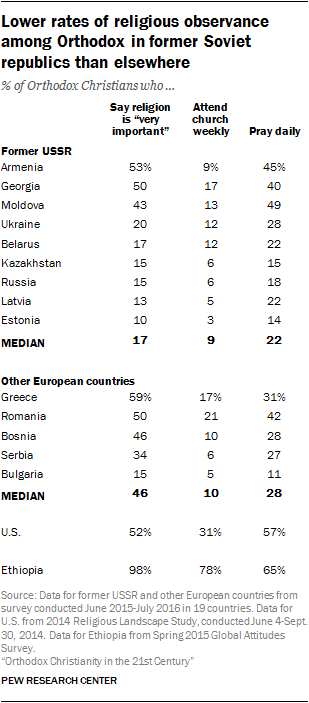 Ethiopian Orthodox Christians are considerably more religiously observant than Orthodox Christians living in Europe and those living in the United States. The majority of Orthodox Christians in Ethiopia say they attend church weekly (78%) and pray daily (65%), and nearly all (98%) say religion is “very important” in their lives.
Ethiopian Orthodox Christians are considerably more religiously observant than Orthodox Christians living in Europe and those living in the United States. The majority of Orthodox Christians in Ethiopia say they attend church weekly (78%) and pray daily (65%), and nearly all (98%) say religion is “very important” in their lives.
Levels of religious observance are especially low among Orthodox Christians in the former Soviet republics surveyed, where the shares saying they attend church weekly range from 3% in Estonia to 17% in Georgia. Similarly, in five other European countries surveyed with significant Orthodox populations, fewer than a quarter of Orthodox Christians in each country surveyed say they are weekly churchgoers, although people in these countries are, on average, far more likely than those in the former USSR to say religion is “very important” in their lives.
Among those surveyed, American Orthodox Christians show moderate levels of religious observance. A slim majority say they pray daily (57%), while about half say religion is very important to them personally (52%). Roughly one-in-three (31%) Orthodox Christians in the U.S. say they attend church weekly – a higher level than in any European country surveyed, but much lower than the attendance rate among Orthodox Christians in Ethiopia.
Orthodoxy in Ethiopia
Ethiopia has the world’s second-largest Orthodox population – approximately 36 million people — and a Christian history that dates to the fourth century. Church historians say that during the early 300s, a Christian traveler from Tyre (located within the present boundaries of Lebanon) named Frumentius was taken captive in the Kingdom of Aksum, located in northern Ethiopia and Eritrea. After his release, he helped spread Christianity in the region and was later named the first Bishop of Aksum by the Patriarch of Alexandria (located in Egypt). Today’s Orthodox community in Ethiopia traces its religious roots to Frumentius’ period. 16
Survey results indicate that Orthodox Ethiopians, who now constitute 14% of the global Orthodox population, are much more religiously observant than are Orthodox Christians in Central and Eastern Europe and the United States. For example, 78% of Orthodox Ethiopians say they attend church at least weekly, compared with a median of 10% of Orthodox Christians in the European countries surveyed and 31% of Orthodox Christians in the United States. And 98% of Orthodox Ethiopians say religion is “very important” to them, compared with 52% in the United States and a median of 28% of Orthodox Christians in Europe who say this.
The Orthodox Church in Ethiopia is part of the “Oriental” branch of the tradition, in communion with five other Oriental Orthodox churches (Egypt, India, Armenia, Syria and Eritrea). One distinguishing factor of Ethiopian Orthodoxy is its usage of practices rooted in Judaism. For example, Orthodox Ethiopians observe the Jewish Sabbath, circumcise their sons at eight days old, and follow Jewish dietary laws. In addition, a text celebrated by Orthodox Ethiopians draws an historical connection to King Solomon of Israel, who is believed to have fathered a son with Queen Makeda of Ethiopia (the Queen of Sheba). This son, Menelik I, became an emperor of Ethiopia about 3,000 years ago and is said to have taken the Ark of the Covenant from Jerusalem to Ethiopia, where many Orthodox Ethiopians believe it still resides.17
Majority of U.S. Orthodox Christians are absolutely certain of their belief in God
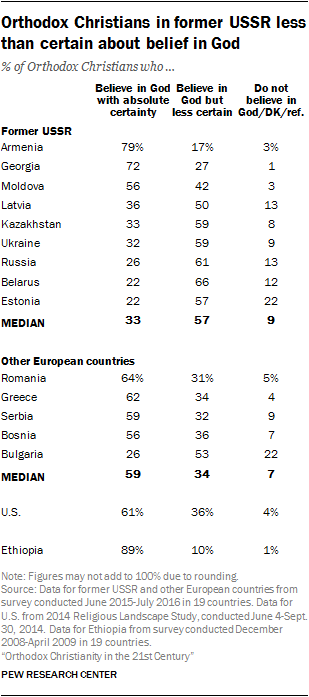 The vast majority of Orthodox Christians around the world believe in God, but many are less than certain about this belief.
The vast majority of Orthodox Christians around the world believe in God, but many are less than certain about this belief.
Overall, Orthodox Christians living in former Soviet republics are considerably less likely than those living in other countries surveyed to say they are absolutely certain about their belief in God. Majorities say this in Armenia (79%), Georgia (72%) and Moldova (56%), but fewer Orthodox Christians express this certainty elsewhere, including just 26% in Russia.
Meanwhile, majorities of Orthodox Christians in Ethiopia, the U.S., Romania, Greece, Serbia and Bosnia say they are absolutely certain that God exists. Ethiopian Orthodox Christians are more likely than others surveyed to say they believe in God with absolute certainty: Nearly nine-in-ten (89%) say this.
Most Ethiopian Orthodox Christians say they tithe, fast during Lent
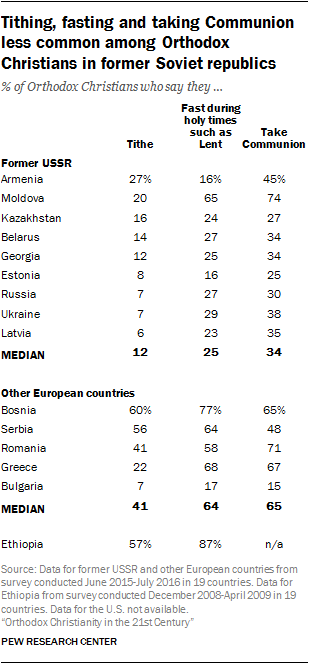 Tithing, receiving Communion and fasting during holy periods such as Lent are common practices among Orthodox Christians in countries outside the former USSR. Although fasting during Lent is less common in Bulgaria, majorities in Bosnia (77%), Greece (68%), Serbia (64%) and Romania (58%) say they fast during Lent, as do 87% of Ethiopian Orthodox Christians. By comparison, in the former Soviet republics surveyed, only in Moldova do a majority (65%) of Orthodox Christians report that they fast during Lent.
Tithing, receiving Communion and fasting during holy periods such as Lent are common practices among Orthodox Christians in countries outside the former USSR. Although fasting during Lent is less common in Bulgaria, majorities in Bosnia (77%), Greece (68%), Serbia (64%) and Romania (58%) say they fast during Lent, as do 87% of Ethiopian Orthodox Christians. By comparison, in the former Soviet republics surveyed, only in Moldova do a majority (65%) of Orthodox Christians report that they fast during Lent.
In no former Soviet country do a majority of Orthodox Christians report tithing – that is, giving a set percentage of their income to charity or to the church. Tithing is a more common practice among Orthodox Christians in Bosnia (60%), Ethiopia (57%) and Serbia (56%). Once again, Bulgaria stands out on the low end; only 7% of Orthodox Christians there say they tithe.
Nearly all Orthodox Christians in Europe have been baptized
 Two religious practices that are very common among Orthodox Christians regardless of where they live are baptism and keeping religious icons in their home. The vast majority of Orthodox Christians in the countries surveyed say they have icons of holy figures, including nine-in-ten or more in Greece (95%), Romania (95%), Bosnia (93%) and Serbia (92%). And despite their low levels of overall religious observance, majorities of Orthodox Christians living in all former Soviet republics surveyed say they have icons in their homes.
Two religious practices that are very common among Orthodox Christians regardless of where they live are baptism and keeping religious icons in their home. The vast majority of Orthodox Christians in the countries surveyed say they have icons of holy figures, including nine-in-ten or more in Greece (95%), Romania (95%), Bosnia (93%) and Serbia (92%). And despite their low levels of overall religious observance, majorities of Orthodox Christians living in all former Soviet republics surveyed say they have icons in their homes.
Even though religious practices were largely suppressed during the Soviet era, the vast majority of Orthodox Christians living in the former USSR say they were baptized. Baptism is nearly universal among Orthodox Christians in Greece, Romania and a few other European countries.
Large majority of Orthodox Christians in Europe say they light candles in churches
 The vast majority of Orthodox Christians in every European country surveyed say they light a candle when they visit a church, and, in most countries, majorities say they wear religious symbols.
The vast majority of Orthodox Christians in every European country surveyed say they light a candle when they visit a church, and, in most countries, majorities say they wear religious symbols.
Wearing religious symbols (for example, a cross) is more widespread in countries of the former Soviet Union than elsewhere. In every country surveyed in the former Soviet Union, most Orthodox Christians say they wear religious symbols. By comparison, in European countries that were not part of the Soviet Union, majorities in Greece (67%) and Romania (58%) say they wear religious symbols, but the practice is less common in Serbia (40%), Bulgaria (39%) and Bosnia (37%).
Belief in heaven, hell, miracles common among Orthodox
Most Orthodox Christians around the world say they believe in heaven, hell and miracles. While these beliefs are especially widespread in Ethiopia, even in the countries of the former Soviet Union, beliefs in heaven, hell or miracles are common.
Overall, Orthodox Christians in the former Soviet republics surveyed are slightly more likely than those in other European countries to say they believe in heaven, and considerably more likely to say they believe in hell.
And in the U.S., majorities of Orthodox Christians say they believe in heaven and in hell, although there is a particularly large gap between the share who say they believe in heaven and those who say they believe in hell (81% and 59%, respectively).
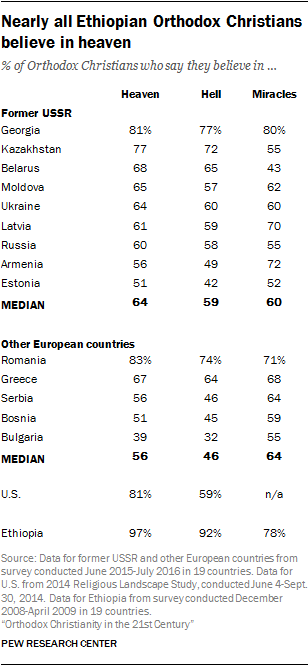
Widespread belief in fate and the soul among Orthodox Christians
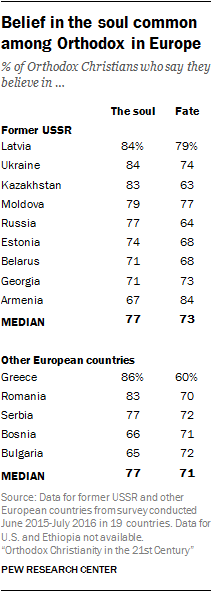 Among the countries surveyed, majorities of Orthodox Christians say they believe in fate – that is, that circumstances in one’s life are largely predetermined.
Among the countries surveyed, majorities of Orthodox Christians say they believe in fate – that is, that circumstances in one’s life are largely predetermined.
Similarly, across Europe, majorities of Orthodox Christians say they believe in the existence of the soul. Orthodox Christians in former Soviet republics are just as likely as those living in other European countries to believe souls exist.
Many Orthodox Christians believe in evil eye, magic
The survey in Central and Eastern Europe, and the survey in Ethiopia included a few questions about religious or spiritual beliefs that are not directly associated with Christianity, and the results show that many Orthodox Christians adhere to these beliefs. Majorities in about half the countries surveyed say they believe in the “evil eye” (i.e., that certain people can cast curses or spells that cause bad things to happen to someone), and more than a third in most countries say they believe in magic, witchcraft or sorcery.
Fewer Orthodox Christians believe in reincarnation, a concept more associated with Hinduism, Buddhism and other Eastern religions. Still, in most countries, at least one-in-five Orthodox Christians say they believe in reincarnation.
Belief in the evil eye is especially common among Orthodox Christians living in the former USSR. Across these countries, a median of 61% say they believe in it. In other European countries surveyed, belief in the evil eye is relatively high in Greece (70%), but lower elsewhere.
In Ethiopia, just about a third (35%) of Orthodox Christians say they believe in the evil eye – a lower level than among Orthodox Christians in Europe and among Christians elsewhere in Africa.
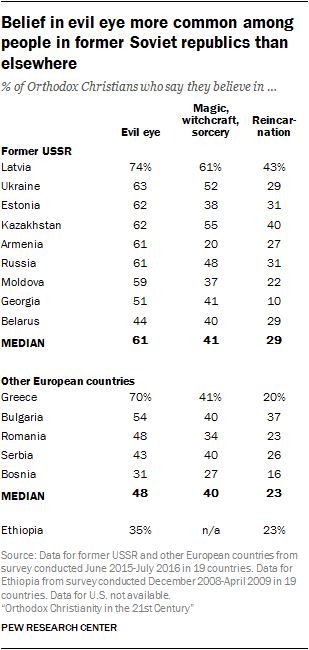
 Majority of Orthodox Christians in Ethiopia take exclusivist views of religion
Majority of Orthodox Christians in Ethiopia take exclusivist views of religion
Most Orthodox Christians in Ethiopia say theirs is the one true faith leading to eternal life in heaven, and that only a single way exists to correctly interpret their religion’s teachings. But among Orthodox Christians elsewhere, these views of religion are less common.
Generally, Orthodox Christians in the former Soviet republics surveyed are somewhat less likely than other Orthodox Europeans to hold exclusivist views. In most of these countries, well under half say that only their religion leads to eternal life in heaven, or that there is only one correct way to understand their religion. By comparison, in Romania, nearly half take these views (47% each).


